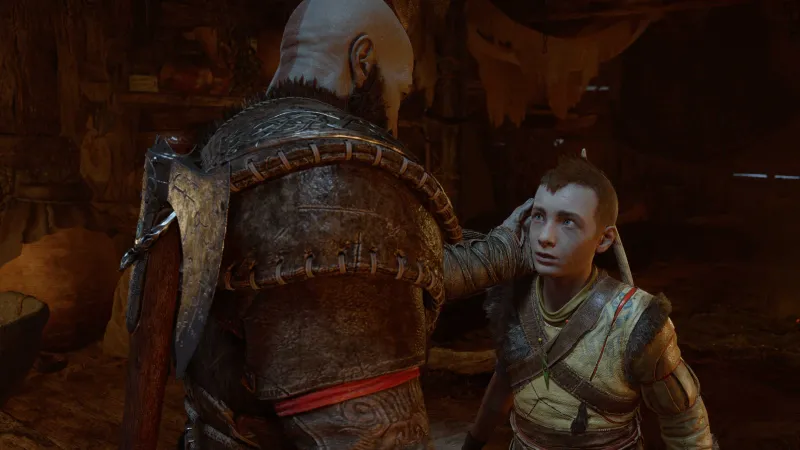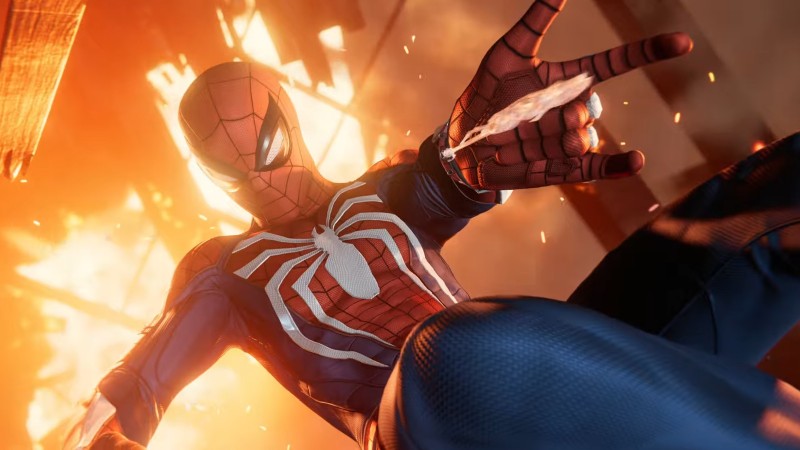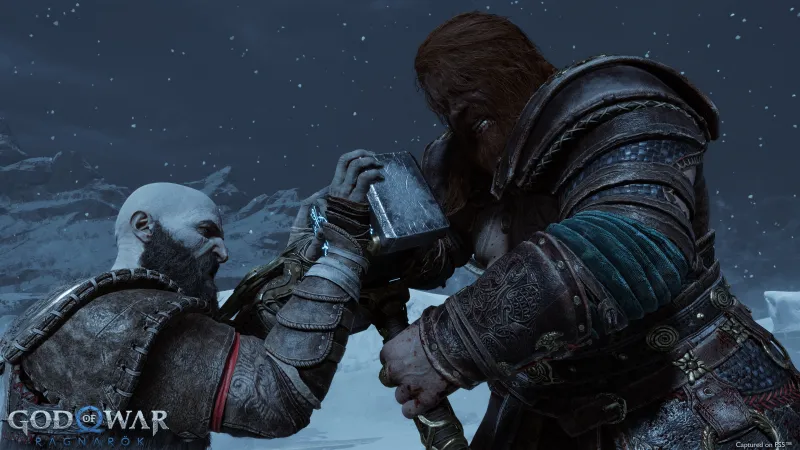
Eric Williams has been working on God of War since the first game, and his credits extend beyond Kratos' journey to titles like Darksiders and Insomniac's Spider-Man, but he will always consider Sony Santa Monica home. For God of War Ragnarök, Williams put a pause on his video game consulting business to take on the director role for the highly anticipated sequel. We spoke with Williams about why God of War 2018's director, Cory Barlog, had to convince him to take on the role, why nearly every God of War game has a new director, how he discovered he is not able to generate visuals in his mind's eye, how the surprising casting of Richard Schiff as Odin came about, and plenty more. You can check out the full interview below, which is free of God of War Ragnarök spoilers, so feel free to read even if you are only starting the game today.
Game Informer: Cory Barlog, talking about the 2018 God of War, was open about his personal inspirations that are reflected in the game. Do you have comparable personal elements you were able to inject into Ragnarök?
Eric Williams: I am not as open, heart on my sleeve, into the game as he is. It’s just a different style of going about this. But a lot of our team, specifically the writing staff and whatnot. There were times where I was like, “Okay, I had this happen in my life,” and you wonder if there's a way to inject that into this character because it seems like that's what's missing. That we don't have any heart in this, so it’s just feeling a little flat. So we had a lot of discussions around those types of things, but I kind of look at it like this. I'm not a father myself, right? So to try to pretend to know exactly how all these feelings would go. It was more like I’ve got to trust the people that are parents for those type of things.
I looked at it from the opposite. I was like, I'm going to dig deep into me being a kid, and I'm going to look at it from Atreus’ point of view because everybody that is currently a parent? That's hard to let that go because that's your day every day. You can’t just take a break from being a parent. So I was like, maybe this will work out because I'm in the unique position in that way. So I kind of really push from the Atreus side like, “Okay, like, how is it going to be?”
They're starting to question things and formulate a world opinion and not always just taking direction from the parents and doing exactly what you're told. That was the most me part of it. I was always trying to always fight for the Atreus P.O.V. And not just push for Kratos to be talking down to him again all the time. I wanted them to kind of feel like equals.
I was looking over your credits and on the God of War games in the past – and please correct me if I'm wrong about this because I'm looking at Moby Games – but it seemed like you were mostly focused on combat. Was Ragnarök a huge change for you being in the director role? Or have things been slowly building up to this over time?
It's been a slow build for sure because even back on God of War II when Cory took over – Cory and I have worked together for twenty years – I've always kind of been like that right there with him. They used to joke and call me AD on the side because they're like, “He's just the assistant director,” and things like that because we just had a great partnership.
And then we both left around 2008, and I went to be a design consultant. I was working with a lot of teams, and he was writing and doing other stuff and bounced around a couple of places. But every time he'd land somewhere, he would call me and be like, “Hey, you should come over and help me out.”
And so, you know, I would fly to Sweden, or fly to Australia or wherever the heck he was, or over to the bay when he was working with Lucas. You pick up a lot of stuff because you're bouncing around all these different places. I worked with like probably 24 different studios in the ten years that I was a consultant, so you see how things are done. You meet people that have done this a lot. You get to pick a lot of brains. So, I was building up this huge library of knowledge. It was funny because when I quit, I said I was going on vacation because consulting was like a vacation for me because I got to kind of do what I wanted to do, even though I was still working in games. But frankly, I crammed like 30 years of development into that because I was working anywhere from two to four projects simultaneously.

A good example: when we were finishing God of War 2018, I was also working on Spider-Man with the team at Insomniac, I was working with Ready at Dawn on their IP, and I was working with a team in Poland all at the same time with.
I would come to Santa Monica in the morning from like 8 AM to 12 PM, drive to Burbank to work on Spider-Man until like 7 PM, and then drove back to Santa Monica and work on that, and then the next day might be at Ready at Dawn all day. I was just doing this all over the place.
So I was picking up stuff, working with Ready at Dawn, learning how they do stuff, working with Cory, working with Brian [Horton, co-director of Spider-Man] over at Insomniac, so I saw all these different people and was picking up stuff. And then I got to have a master class with [Mad Max: Fury Road director] George Miller when we were in Australia,
I was curious if, during all your time working with Cory, if you got to work with George Miller at all.
Yeah, I did. That was incredible. We could do the whole interview just on that alone. How much I learned in just the ten days I was over there. Cory spent months there, almost a year. I was jealous of that because he was just getting an influx of all this amazing stuff.
I am sort of meandering a bit, but basically, I had all this packed away from different points of view, and then I was still learning a lot of things on my own on the side. So, when Cory finally was like, “Hey, man, I'm tired after 2018. You should do this. I think you're ready for it,” I said, no. I was resistant for a long time. It took him six months to convince me to do it because I was thinking I would just help. I wasn't sure if I wanted to go out there and be the leader. And I didn't know if I could be the leader. So it was a new challenge. It was time to take on something new. And we went for it and it worked out.
I'm not going to lie. I messed up a lot in the beginning. There were a lot of growing pains, dealing with different personalities and learning that not everybody can move at the same speed. It’s just a lot of that stuff, and you have to kind of just make mistakes. But I do say that when you do make a mistake, it's what you do next that counts the most.
You just have to try to right those wrongs immediately and get back on the horse and moving in the right direction. I think we got there in the end, but we’ll see. It’s the people that matter. I can't wait for the fans to play tomorrow because that's really the true test, right? It’s different when players put their money down and say, “I want to be entertained.” When you hear that review? That's a strong review.

So you had to make a choice that this would be your full-time job when you finally made that decision?
Yeah, my little consulting business is on hold. I still pay the little LLC fee every year to keep it alive, but I'm here full-time on this game. But it was good to come home. Santa Monica's what made me, you know? Like I was at a small studio with Cory way back in the day, and we made a lot of games that weren’t very good.
He came here in 2003 and then I came in 2004, and they really believed in us. They gave us every opportunity to succeed. If I was going to come home, this was the home I needed to come home to, to do this game. I made a lot of friends at Insomniac and Ready at Dawn and other places, but this is always like the real home to come back to.
This may be a question you don't have the answer to yet, but is this going to be your home for the foreseeable future?
Well, up until you guys put the reviews out, I didn't know. I was like, “Man, if this doesn't score well, they're going to show me the door real quick.”
Is that really something you were worried about, though? After seeing the completed game?
